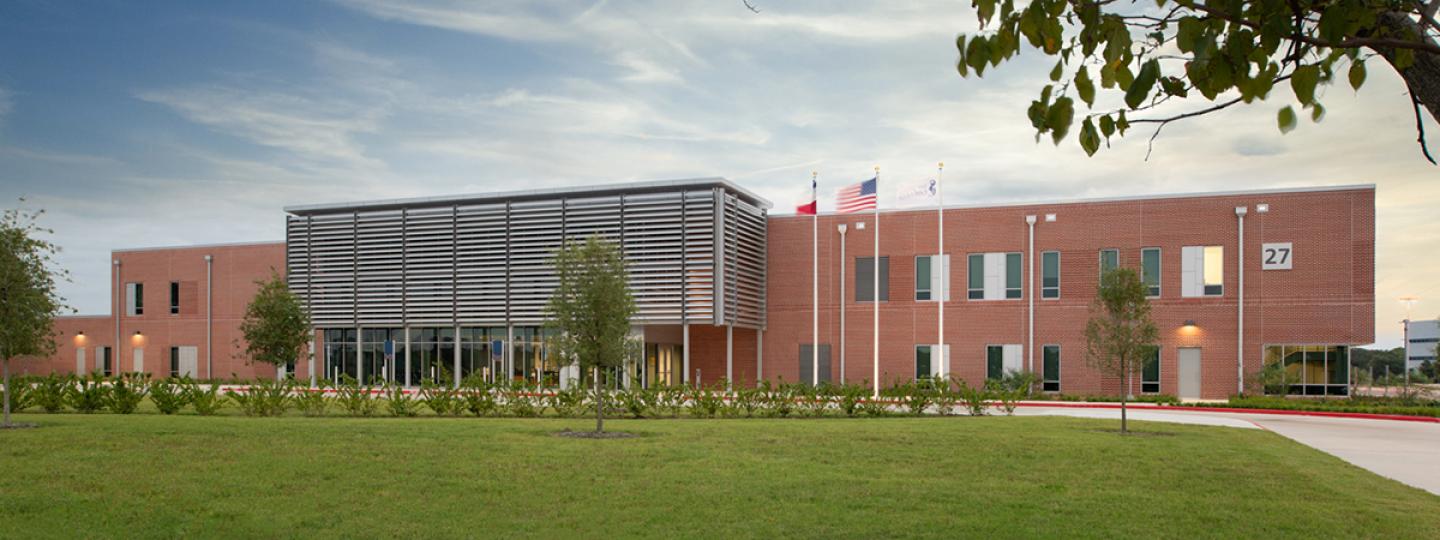College's new facilities are put to good use

Construction on San Jacinto College's new campus facilities is reaching completion. Funded by the College's 2015 bond referendum of $425 million, additions and renovations to the Central, North, South, and Maritime Campuses have been in progress since 2019.
At the Central Campus, the $60 million LyondellBasell Center for Petrochemical, Energy, & Technology, or CPET, is the largest petrochemical training facility in the Gulf Coast region. Built for and designed by industry, the 151,000-square-foot instructional complex features a multifunctional glass pilot lab and an exterior 8,000-square-foot glycol distillation unit for process operations training. CPET also features 35 custom interior labs, 20 interactive classrooms, and three computer labs. It houses the air conditioning technology, electrical technology, electronics, engineering design graphics (drafting), environmental health and safety technology, instrumentation/analyzer technology, nondestructive testing, pipefitting/fabricator, process technology, and welding programs.
The campus' Welcome Center (pictured at top) has also seen its share of students. The $16.6 million, 43,000- square-foot facility serves as a one-stop shop for admissions, enrollment services, veteran services, financial aid, tutoring, testing centers, education planning, counseling, and the campus business office.
"Our new Welcome Center and CPET are just two of the major improvements to the Central Campus that help students and their families achieve their dreams," Van A. Wigginton, Central Campus provost, said. "Our new CPET facility highlights the key role petrochemical industries play in the economic prosperity of our community."
Besides these new facilities, the 60,000-square-foot Frels classroom building has seen $4.2 million in upgrades, including more classroom and lab space and a new dining area to support three Pasadena ISD early college high school programs. Renovations are also underway at the McCollum Building, repurposing the space for updated classrooms and offices.
At the North Campus, construction ended last year on the new Cosmetology and Culinary Center. The $22.3 million, 57,000-square-foot facility gives students industry-standard training.
The culinary wing features a bakery, kitchens with food prep stations, walk-in refrigerators and freezers, and a bistro dining area open to the public and able to host catered events. The cosmetology wing includes a full-service salon and spa, where clients can get massages, facials, haircuts, color treatments, manicures, and pedicures.
"The Cosmetology and Culinary Center is a fantastic resource and experience for our students with its state-of-the-art design, modern labs, and new technology," Dr. Alexander Okwonna, North Campus provost, said. "I want to thank our community for supporting us and approving the bond to serve our students better."
At the South Campus, the $27.7 million, 74,000-square-foot Engineering and Technology Center features a MakerSpace with a 3D print shop, metal shop, and a woodshop where students can build their designs. New computer labs with industry-standard software serve the academic and technical programs offered in the building. The facility houses the engineering technology, biomedical equipment repair technology, engineering design graphics, electronics, and computer information technology programs.
The South Campus Cosmetology Center began welcoming students in spring 2021. The $15.8 million, 39,300-square-foot facility boasts student lounges, a full-service salon, and updated labs and classrooms to enhance workforce training for future cosmetologists.
"Our Engineering and Technology Center combines cutting-edge instructional tools and beautiful, innovative learning spaces," Dr. Aaron Knight, South Campus provost, said. "Likewise, the Cosmetology Center is a state-of-the-art education and training facility. Both help the College continue to provide our community with excellence in workforce training and academic transfer."
The South Campus Building S23 is being converted into a new central plant. Other campus upgrades and renovations include removing legacy structures in the courtyard, replacing drinking water pipes, and removing overhead powerlines.
The Maritime Campus also received upgrades for its training needs — now offering a new fire trainer and fire house and new lifeboat davits.


